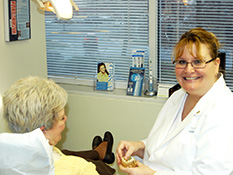Americans are living longer and continuing to enjoy the lifestyles they have grown accustomed to, in large part, thanks to advances in modern medicine and dentistry. No longer are seniors housebound, forced to live out their senior years watching television in the recesses of an isolated dark living room. 
Advances in dentistry have created not only the opportunity, but the expectation of continued oral health throughout a lifetime. People expect to enjoy active lifestyles which include the enjoyment of fine dining and the youthful look a full dentition provides by supporting facial structures and thus retaining a youthful appearance. Medicine has shown time and time again that nutrition is one of the key factors in maintaining health, requiring a healthy dentin to perform this function. The oral-systemic relationship is proven; chronic inflammation or infection in the mouth affects the whole body. Periodontal disease, a chronic inflammation, has been proven to increase the likelihood of stroke, heart attack, diabetes and other maladies. Infection in the mouth increases the rate of prosthetic joint failure and rejection. Examples of the correlation between oral health and overall health are endless.
Seniors however, provide increased challenges to maintain a healthy, comfortable, functioning dentition. Many factors increase the rate of dental decay, periodontal disease and the overall decline of dental health. Seniors have become one of our most “needy” groups of dental patients. Manual dexterity dramatically decreases as we age. Diseases such as arthritis, reduce one’s ability to maintain daily hygiene at levels common throughout life. A more sedimentary lifestyle and the lack of a large family unit at home decrease the drive to prepare healthy meals. Seniors eat more simple, preprepared meals full of empty calories and processed sugars, making them more cavity prone. Saliva is one of our best defenses against dental decay. Many, many families of drugs create a dry mouth as a side effect of their intended benefits. Combine declining home care, a high caloric diet, with dry mouth secondary to medication and it is not uncommon to witness a lifetime of heath and care decline and fail in a very short period of time.
As dentistry has become more aware of these problems, the profession has become proactive in preventing them. The days of a manual toothbrush are gone. Rotary/battery operated tooth brushes, used on a daily basis, provide the level of bacteria laden plaque control almost equal to a profession prophylaxis. Supplemental fluoride rinses and prescription level fluoridated toothpastes are very effective in controlling changes in diet and dry mouth. Educating our patients to their age specific risk factors and ways to prevent, has eliminated countless problems before they occurred.
One must not forget how the advances in modern dentistry also keep are seniors healthy! Lifelike porcelain crowns recreate beautiful, youthful, smiles destroyed by a lifetime on wear and possibly neglect. Composite, or white fillings, replace ugly silver amalgam restorations and bond remaining tooth structure together. Advances in endodontics or root canals, make preserving and saving teeth much more of a possibility than even 20 years ago. Bridges and removable partial dentures replace lost teeth with precision not accomplishable only a few years ago. Implants are one of the greatest advances in modern dentistry Implants can be used to support a single crown, replacing a lost tooth A complex of implants can support an entire dental prosthesis and improve the quality of life of our patients not possible until recently.
“Old age” is no longer a prescription for poor oral health. Advances in dental care and the understanding of the special needs of are mature patients make it possible to preserve, protect, and restore the detention to a level of form and function mother nature provide.
Paul W. Callahan, D.D.S.